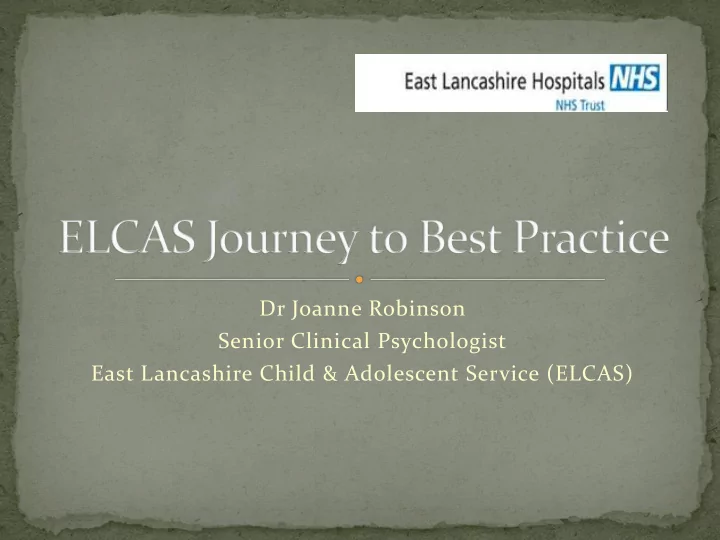

Dr Joanne Robinson Senior Clinical Psychologist East Lancashire Child & Adolescent Service (ELCAS)
Early 2017, IAPT Phase 7 Ethos of Training and Quality Improvement Long established CORC member Clinician reported outcome measures Consultant Psychiatrist – IAPT Service Lead Visits to other CAMHS Services ROMS Representatives
High Quality care Complex care Needs Aim – to become CORC Accredited Support from Service Lead, Senior Managers Results – how it informed next steps
How Measures are being used Training, Knowledge & Skills Technology & Information Management Leadership & Management Attitudes to implementation of ROMS
42% never received training 79% wanted to know more BUT confident in working with ROMS Mixed views re. ease of access to ROMS in sessions Less than a quarter felt there was a shared vision
Vision Sharing data with CYP Strengthen feedback loop with staff Training and Development Interests Review systems for recording outcomes: supervision, team MDT discussions Explore a variety of measures
2017 2018 Supervision Policy Focus on Staff Peer Training development IAPTUS – directly Leadership and inputting ROMS management Need for a ROMS lead Infrastructure CORC Training Service User Participation Reports
CORC Regional Advisors – helped reflection on current practice, e.g. via Staff surveys Training Quality Assurance in action planning
ROMS Representatives Supported by Service Leads Meet every 2 weeks for an hour Links to Sector Teams & Service User Participation Group
Vision Statements Quality Standard Engagement Day Staff Training: peer-led & CORC led re. specific measures ROMS and IAPTUS Recruitment of ROMS Lead (administration) Addition to Service Supervision policy Use of ROMS in MDT meetings Notice Board Positive Attitude towards ROMS
At ELCAS we care about the views of children, young people, and their families. We value feedback on the care they are receiving, and are keen to learn more from service users. Children and young people describe completing regular measures of outcome and experience as helpful. Using questionnaires to measure the effectiveness of the care we provide can help us improve the quality and safety of our clinical practice. We are committed to developing a culture across ELCAS of the regular use of patient-reported outcome and experience measures (alongside clinician-reported measures), to ensure we are providing personal and effective care.
Assessment 6 months after Assessment End of Treatment Episode Current View Current View CGAS CGAS CGAS SDQ SDQ SDQ RCADS RCADS RCADS Set Goal on IAPTUS Track Goal on IAPTUS Track Goal on IAPTUS CHI-ESQ
Summary Report regarding Outcomes Monitoring Range 34-39% paired measures on open cases Range 39 – 58% paired measures at discharge
Moving towards session by session measures Use of technology e.g. webforms Service User Involvement Live Reporting Outcomes driving provision of care
Recommend
More recommend